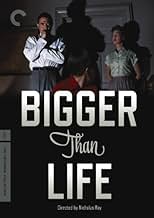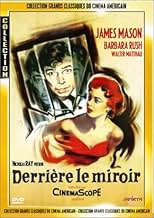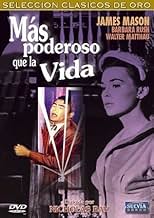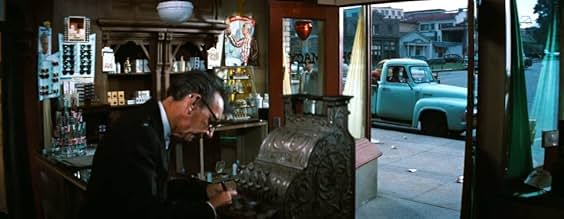IMDb RATING
7.4/10
8.6K
YOUR RATING
A seriously-ill schoolteacher becomes dependent on a miracle drug that begins to affect his sanity.A seriously-ill schoolteacher becomes dependent on a miracle drug that begins to affect his sanity.A seriously-ill schoolteacher becomes dependent on a miracle drug that begins to affect his sanity.
- Awards
- 2 nominations total
Robert F. Simon
- Dr. Norton
- (as Robert Simon)
David Bedell
- X-Ray Doctor
- (uncredited)
Gail Bonney
- Mother at PTA Meeting
- (uncredited)
Harold Bostwick
- Gentleman
- (uncredited)
Lovyss Bradley
- Churchgoer
- (uncredited)
Mary Carroll
- Mother at PTA Meeting
- (uncredited)
Virginia Carroll
- Mrs. Jones
- (uncredited)
Mary Carver
- Saleslady
- (uncredited)
Betty Caulfield
- Mrs. LaPorte
- (uncredited)
Featured reviews
James Mason becomes "Bigger than Life" in this 1956 Nicholas Ray film that also stars Barbara Rush and Walter Matthau. Mason plays Ed Avery, a schoolteacher who also is a part-time cab dispatcher. He is suffering from severe spasms that are getting worse.
Ed learns that he has a terminal illness that perhaps can be cured with a steroid, cortisone. He is helped, but he also begins to suffer from mood swings and depression and, as he takes more and more, veers completely out of control. Barbara Rush plays his suffering wife, and Walter Matthau is a family friend and coworker.
I actually had a family member who went into profound depressions because of continuing to take black market cortisone, so this film resonated with me. Mason, who produced the film, is terrifying. Barbara Rush is very good, though her character puts up with an awful lot before she makes a move. Matthau is good in a supporting role, but roles showcasing his true strengths as an actor were a few years away.
This is much more than a cautionary tale about steroids, which need to be taken and tapered off very carefully. In his cortisone-induced mindset, Ed Avery spouts off on the problems in society, very unusual in the repressed '50s. His ideas are a tad over the top, but there's a good kernel in them. Ray always did well with a rebellious mindset.
Ed learns that he has a terminal illness that perhaps can be cured with a steroid, cortisone. He is helped, but he also begins to suffer from mood swings and depression and, as he takes more and more, veers completely out of control. Barbara Rush plays his suffering wife, and Walter Matthau is a family friend and coworker.
I actually had a family member who went into profound depressions because of continuing to take black market cortisone, so this film resonated with me. Mason, who produced the film, is terrifying. Barbara Rush is very good, though her character puts up with an awful lot before she makes a move. Matthau is good in a supporting role, but roles showcasing his true strengths as an actor were a few years away.
This is much more than a cautionary tale about steroids, which need to be taken and tapered off very carefully. In his cortisone-induced mindset, Ed Avery spouts off on the problems in society, very unusual in the repressed '50s. His ideas are a tad over the top, but there's a good kernel in them. Ray always did well with a rebellious mindset.
Back in 1956 this must have been a very daring flick indeed. Of course it has dated and today it packs less of a punch but it still remains a very sincere film anchored by a superb James Mason performance. Walter Matthau is similarly top rate though in a smaller and less flashy role. The direction is absolutely mesmerizing and I only felt slightly uneasy about the psychiatric approach of the day and the flashing red screen reflecting Mason's mental disintegration which was so in fashion in films of the time.
Even so, it was not enough to spoil the pleasure afforded by the many good aspects in this movie that I found quite riveting and intelligent for the most part. The bit where Mason snips the phone cord is as frightening as it is memorable, to me the highpoint of a honest yet never predictable work.
Even so, it was not enough to spoil the pleasure afforded by the many good aspects in this movie that I found quite riveting and intelligent for the most part. The bit where Mason snips the phone cord is as frightening as it is memorable, to me the highpoint of a honest yet never predictable work.
This is an excellent movie. I saw it once, and I never wish to see it again. I grew up in a household like this, only there was never a solution to my father's mania, depression, and incredible anger.
About all I can say about Mr Mason's performance, and that of Ms Rush, is that they could have been my parents, and I could have been that kid. It never got to the point where I was offered up like Isaac, but the rest of it was right, right down to the speech where the father condemns all children because they're ignorant. I'd heard that one. His wife was helpless; they all are.
I do not know where the screenwriters got their dialog, but I hope they didn't learn it the way I did. As it happened, I was terrified and transfixed while watching it, only calming down after the father realized that something was wrong, and vowed to correct it, and there was a means of correcting it.
When the movie was over--I don't know if I watched it in the theater or on TV--I had to go home, where there was still rage, and no solution to it. I would have been nine years old.
There was a time that I wanted my parents to see that movie, in the hope that they'd realize that this was how they acted, and stop it.
It never happened. They were divorced years later. My father was angry and crazy right up to the day he died three years ago. My mother, in her nursing home in Cleveland, maintains that I must be making it all up.
M Kinsler
About all I can say about Mr Mason's performance, and that of Ms Rush, is that they could have been my parents, and I could have been that kid. It never got to the point where I was offered up like Isaac, but the rest of it was right, right down to the speech where the father condemns all children because they're ignorant. I'd heard that one. His wife was helpless; they all are.
I do not know where the screenwriters got their dialog, but I hope they didn't learn it the way I did. As it happened, I was terrified and transfixed while watching it, only calming down after the father realized that something was wrong, and vowed to correct it, and there was a means of correcting it.
When the movie was over--I don't know if I watched it in the theater or on TV--I had to go home, where there was still rage, and no solution to it. I would have been nine years old.
There was a time that I wanted my parents to see that movie, in the hope that they'd realize that this was how they acted, and stop it.
It never happened. They were divorced years later. My father was angry and crazy right up to the day he died three years ago. My mother, in her nursing home in Cleveland, maintains that I must be making it all up.
M Kinsler
Ed Avery (James Mason) is a school teacher with loving wife Lou (Barbara Rush) and son Richie. Pat Wade and Wally Gibbs (Walter Matthau) are his friends fellow teachers. He starts blacking out from terrible pains. Hospital doctors diagnose him with a rare disease and give him experimental cortisone treatment. He makes a remarkable recovery and given cortisone tablets to take. His personality starts to change and he begins to abuse the pills.
The subject matter of prescription drug abuse is prescient although the madness is sometimes reminiscent of the old educational films of the dangers of marijuana. The 50's nuclear family does keep this mired in an old fashion style. Nevertheless, it is very admirable to see this issue tackled. The widescreen CinemaScope does something interesting to the interior scenes. When the walls on both sides of the room can be seen, it pulls the audience inside the rooms. The characters and their story becomes even more immediate.
The subject matter of prescription drug abuse is prescient although the madness is sometimes reminiscent of the old educational films of the dangers of marijuana. The 50's nuclear family does keep this mired in an old fashion style. Nevertheless, it is very admirable to see this issue tackled. The widescreen CinemaScope does something interesting to the interior scenes. When the walls on both sides of the room can be seen, it pulls the audience inside the rooms. The characters and their story becomes even more immediate.
Nicholas Ray was one of the greatest directors to come out of Hollywood. His movies are always about something and that something has a cinematic flair that makes the experience thought provoking and thoroughly entertaining. Here is Cortisone the excuse for a slap in the face of a society that was getting more complacent and more spoiled with an avalanche of "new" things coming to overwhelm our daily lives. "We're dull, we're all dull" tells James Mason to his wife. Barbara Rush is superb as a Donna Reed type with a monster in the house. James Mason, a few years away from Lolita, also produced this rarely seen classic and gives a performance of daring highs. Highly recommended to movie lovers everywhere.
Did you know
- TriviaThe main manufacturers of cortisone at the time, Merck in the US and Glaxo in the UK, were worried about the impact of this film on the public and their willingness to take the drug if prescribed by their physician. However, by the time of this film's release, newer and better formulations of the drug, along with greater knowledge of its uses and limitations had reduced (but not eliminated) the side-effects experienced by Ed in this film.
- GoofsWhen Ed has a barium X-ray, the image of the swallowed fluid is anatomically inaccurate. The fluid falls straight down to an extremely large "stomach" in his groin area.
- How long is Bigger Than Life?Powered by Alexa
Details
- Release date
- Country of origin
- Languages
- Also known as
- Bigger Than Life
- Filming locations
- Production company
- See more company credits at IMDbPro
Box office
- Budget
- $1,000,000 (estimated)
- Runtime1 hour 35 minutes
- Color
- Aspect ratio
- 2.55 : 1
Contribute to this page
Suggest an edit or add missing content































